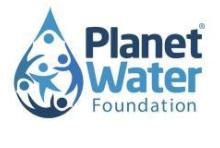Since 2009, Planet Water has deployed more than 2,000 projects that provide clean water access to more than 4.5 million people across 32 countries.
Planet Water focuses on the following approaches to support environmental and behavioral changes related to clean water access and knowledge and practices around water-health and hygiene among participating communities:
PROVIDING A SAFE WATER SUPPLY
Planet Water projects create access to clean drinking water by deploying ... Mehr lesen
Since 2009, Planet Water has deployed more than 2,000 projects that provide clean water access to more than 4.5 million people across 32 countries.
Planet Water focuses on the following approaches to support environmental and behavioral changes related to clean water access and knowledge and practices around water-health and hygiene among participating communities:
PROVIDING A SAFE WATER SUPPLY
Planet Water projects create access to clean drinking water by deploying AquaTower water filtration systems into primary schools. The AquaTower supports the daily drinking water requirements of up to 1,800 people. The system can operate without power or use of chemicals harmful to the environment and requires no consumables with a very simple maintenance process to produce clean drinking water, which surpasses World Health Organization (WHO) water quality standards. The system will operate for at least 5-7 years without any consumable components with a simple routine maintenance process. The Planet Water team provides an in-depth training for school custodial staff on cleaning and maintenance procedures to ensure the system is well kept and sustainable.
PROMOTING WATER-HEALTH AND HYGIENE
As an essential complement to providing clean water access, our Water-Health & Hygiene education program teaches children the important aspects of hand washing and protecting against germs through a child-friendly, activity-based program incorporating games, drama, song, and dance. The program aims to impact behavior, beliefs, and knowledge around water-health and hygiene while empowering children to be agents of change within their schools, families, and communities.
PRIORITIZING ONGOING MONITORING & SUSTAINABILITY
The deployment of a project marks a long-term commitment to each community. Planet Water visits each project 12 times over the course of four years following deployment, to ensure that all AquaTower systems are fully operational and to reinforce any training on maintenance procedures or the education program.
EMPOWERING COMMUNITIES
Engaging the community before, during, and long after each project is an essential and key component of the Planet Water approach. During initial stages of a project, community stakeholders help identify participating schools, select appropriate sites for the projects, and complete necessary project preparations. Maintaining collaborative relationships is critical for the sustainability of a project, and is emphasized through routine sustainability visits.
ENGAGING EMPLOYEE VOLUNTEERS
Planet Water’s Volunteer Program supports donor corporate social responsibility by providing rewarding experiences for employee volunteers through their active participation in projects while aiming to increase employee satisfaction, retention, and overall productivity. Each deployment lasts one day, allowing employees to carry out a full project within a reasonable amount of time while directly seeing the impact their work and being able to interact with the children being supported. Contact us to discuss volunteering and employee engagement opportunities.
PROGRAM IMPACT
Based on an impact evaluation study completed in partnership with the University of Nebraska Medical Center (UNMC), College of Public Health, Planet Water’s interventions are having a substantial, positive impact on the health and wellbeing of children. The following results were determined one year after implementation:
• Health Outcomes: Children benefiting from Planet Water’s interventions experienced an 80% decrease in total number of diarrheal episodes versus a 27% increase (5.6 times more total episodes) among children in schools not participating in Planet Water’s program.
• Healthy Hygiene Knowledge and Practices: School children benefiting from Planet Water’s interventions demonstrated a 17% higher average score in overall knowledge, practices, and attitudes regarding proper hygiene practices (i.e. hand washing) versus children in schools not participating in Planet Water’s program.
Vollen Text ausblenden





